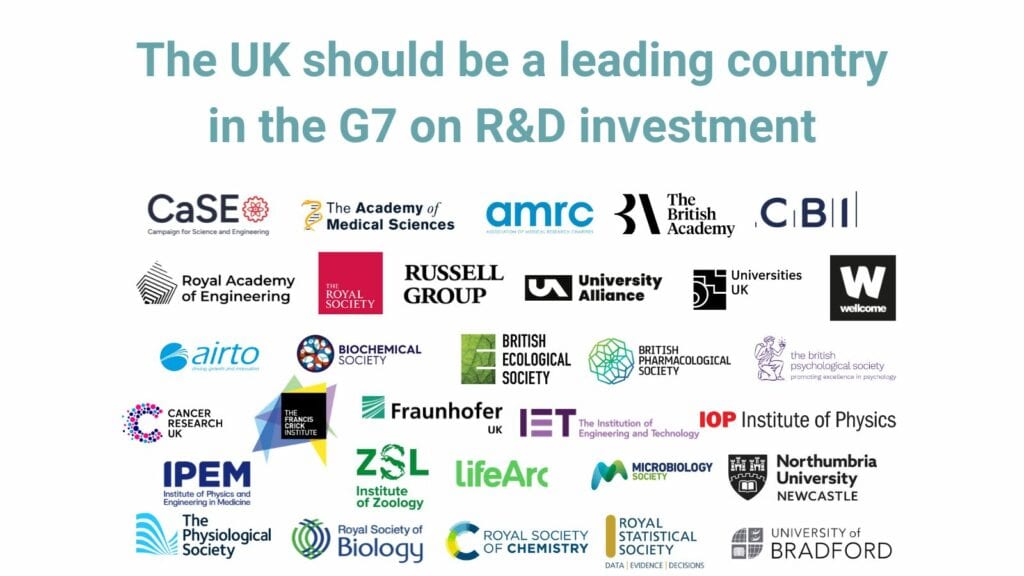Top science and technology takeaways from both conferences
People and skills
Developing a stronger, more diverse and adaptable workforce is essential to unlock an R&D-led UK economy.
Business investment
Supporting a good and enabling environment that enables businesses to thrive is vital to drive research and innovation.
Universities
Universities need to better communicate their vital role as engines of research and innovation, and in solving the challenges facing the UK.
Levelling up
Leveraging regional strengths in research and innovation is needed to grow opportunity across the UK.
Conservative Party conference
At this year’s Conservative party conference there were a notably large number of events focused on research, innovation, science and technology, especially in comparison with previous years.
Many events made the most of the Government’s ‘science superpower’ branding, posing questions about what this would mean in practice and how it could be achieved.
Clusters
At various events, Minister for Science, Research and Innovation George Freeman highlighted work by the Department for Science Innovation and Technology (DSIT) to identify and map science and tech clusters across the UK.
Freeman argued that greater transparency and data about these clusters would help bring in investment, including foreign funds, and allow places across the UK to learn from and collaborate with each other. He emphasised that this was not seeking to drive competition between places in the UK.
Similarly, other speakers during the conference highlighted that not all places have space for expansion, and that partnerships with areas that do would be important when increasing the UK’s research and innovation (R&I) capacity.
People and skills
Freeman noted skills as a potential barrier to the UK becoming a science superpower. He said there was a disconnect between job creation and skills, and that innovative sectors and R&I clusters need the right skills. He also noted Whitehall’s ability to move at pace – which it did successfully during the pandemic, but now needs to capture in the long term – and expressed a desire to increase the proportion of people with science and tech expertise embedded in the civil service.
Immigration and visa costs were raised at various events. Freeman said that the UK would not become a science superpower “behind a visa paywall”, and that attracting young talent was essential for the UK’s research system.
Business investment
Creating an environment that supports business R&I was raised many times. This is the focus of an ongoing piece of work by CaSE. Various speakers noted the importance of creating a stable policy and regulatory environment, including tax incentives, trading relationships and access to finance, along with sustained investment and long-term commitments from policymakers. One speaker described the problems faced by small businesses of a “relentless cycle of piecemeal changes” to tax incentives. Freeman said that tax incentives work, but that while there was support for start-ups, more could be done for scale-ups.
Universities
A key debate was future funding for the sector, including the role that international students play in subsidising UK students. At a fringe event run by the Higher Education Policy Institute to launch its manifesto for the next Government’s higher education policies, discussion focused on the need for universities to demonstrate that they are vital engines of cultural and technological innovation; that they are seen as part of the solution to growth and productivity challenges; and that they are a public good by demonstrating their value to communities, beyond education and research. The discussion also noted that taking these actions would also help universities demonstrate wider value if the general election was fought on populism.
Language
It was welcome that Minister Freeman said that he was working to move from talking about ‘science spending’ to ‘research investment’. This aligns with advice on engaging the public with R&D that CaSE is developing based on the findings of our Discovery Decade public opinion research. We found that the public want transparency and accountability on public investment, and some expressed concerns about money ending up in a “black hole”. However, investment is generally supported: 70% of people said it was important for the Government to invest in R&D.
Labour Party conference
Clearly momentum was with Labour at this year’s conference, with a record number of attendees and packed fringe events. A central message was growing the economy and spreading prosperity across the UK. The role of research, innovation, science and technology in achieving this was a prominent theme that ran throughout the conference.
Fringe events focused on key challenges facing the UK, from decarbonisation and net zero to AI and healthcare. Research and innovation will be critical in solving these challenges and achieving ambitions for the economy, and so it was positive that events discussing R&I had a considerable profile.
The conference also provided a glimpse into some of Labour’s plans for the R&I agenda. Shadow Science Secretary Peter Kyle called for a 10-year funding settlement for R&D to support innovation through longer-term partnerships and provide more certainty.
People and skills
The skills challenges facing the UK workforce featured prominently at this year’s conference. A central theme was on the need for a strong, diverse and adaptable workforce in the face of new and emerging technologies, the changing world of work and future uncertainty. CaSE has recently published a report, The Skills Opportunity, on how to unlock skills for a more R&D-led UK.
Discussions focused on how skills provision will need to evolve to provide greater adaptability and flexibility, with a greater emphasis on a lifelong learning approach. This will require greater consideration of different areas of skills provision, including further and technical education. Keir Starmer outlined that a skills and growth levy would fund specialist technical excellence colleges to equip workers for local industries and skills needs. It’s good to see an ambition to address underfunding of Further Education colleges, which will also help to unlock skills for a more R&I-led UK.
A recurring message across events was the need for greater join-up between different education and skills components and the importance of an overarching tertiary education strategy to drive this.
Business investment
Many events talked about the vital role of businesses in driving innovation, with discussions focusing on supporting a good and enabling environment that enables businesses to thrive.
One speaker highlighted the vital role of tax incentives in helping businesses accelerate research and innovation. In particular, it was stressed that providing a stable tax policy environment is crucial to give businesses the certainty they need.
Other speakers stressed that to become a ‘science superpower’ the UK needs an attractive commercial environment that supports innovation. This will require, amongst others, access to capital for start-ups and scale-ups, a supportive regulatory environment and access to the right R&I infrastructure.
Universities
At a fringe event organised by HEPI, the discussion focused on the need for universities to better communicate their vital role as engines of research and innovation and in solving the challenges facing the UK.
Speakers highlighted that universities play a vital role in the skills system and will be critical to the future labour market. However, it was recognised that future education and skills provision requires greater flexibility and adaptability, with the need for a broader tertiary approach that joins up the different elements of the skills and education system.
Underpinning all this, the current funding system for universities is a major and growing challenge. Despite cross-subsidies from international students’ fees, rising costs will ultimately have an impact on the quality of teaching. There is an urgent need to consider long-term and sustainable funding options for the research and innovation system.



